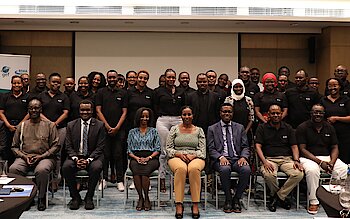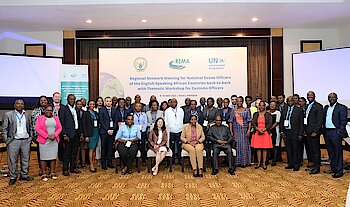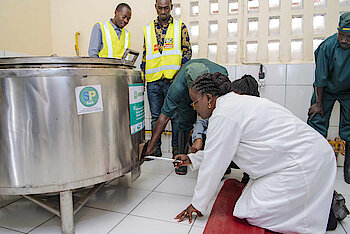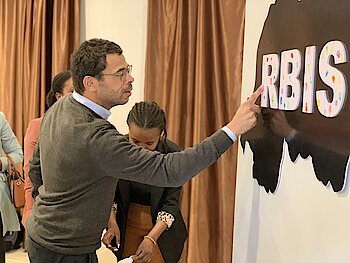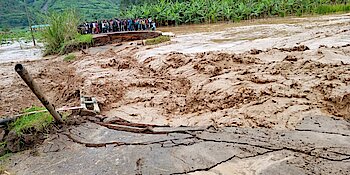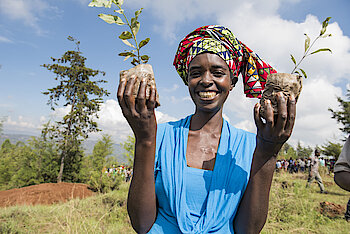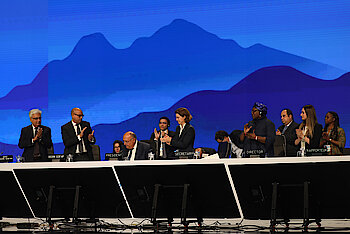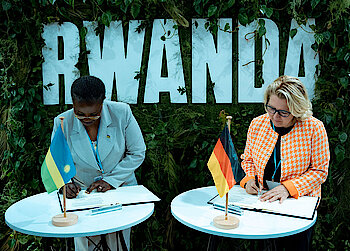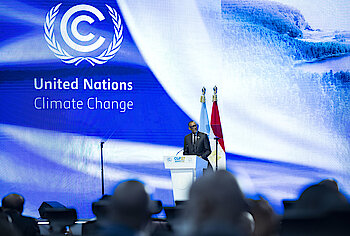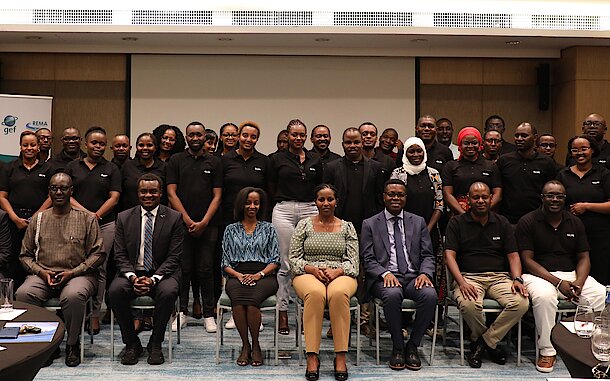
REMA LAUNCHES THE EVIDENCE-BASED CLIMATE REPORTING INITIATIVE TO ADVANCE CLIMATE RESEARCH AND REPORTING
The Rwanda Environment Management Authority (REMA) in collaboration with the African Institute of Mathematical Sciences (AIMS) have on May 19, 2023 launched the Evidence-based Climate Reporting Initiative (ECRI) to advance climate research and reporting
The ECRI is an initiative towards capacity strengthening for climate research and reporting. It includes a 9 months training program includes a nine-month training program that will benefit national experts and officials from public and private sector institutions.
The program will build capacity of government and non-government institutions on Advanced Excel for Data Analysis, Climate modelling and GHG Inventories and Projections
Fifty staff representing more than 20 public and private institutions are being trained through the ECRI program
Speaking at the launch, Juliet Kabera, Director General of the Rwanda Environment Management Authority reminded that “Rwanda has embedded climate action into its national development plans; over the short term and long term. The Government of Rwanda therefore makes capacity strengthening a priority to support climate action initiatives”
As an institution that coordinates Nationally Determined Contributions tracking and reporting, REMA ensures to build in-house and sector knowledge and skills on climate research, monitoring and evaluation.
As part of these efforts, REMA and AIMS signed a 5-year Memorandum of Understanding (MoU) and through this partnership, both institutions implement a capacity and knowledge building initiative.
“Our hope is that the staff representing your institutions in this program will gain practical knowledge and skills, and positive change will be realised in monitoring and evaluation of climate change adaptation and mitigation efforts” said Juliet Kabera at the ECRI launch.
“This course is supportive in different ways. At personal level, it provides new theories as well as practical skills on climate change. At institutional level, it helps to build capacity of employees. For my case I will share the acquired with my colleagues. The course came as an entry point for me and my colleagues to play our part in climate action” said Angelique Kangondo, Trainee and Agriculture Economics Lecturer, Rwanda Inspectorate, Competition and Consumer Protection (RICA)
Rwanda is among countries in Africa to benefit from Capacity Building Initiative for Transparency (CBIT) funded by the Global Environment Facility (GEF) through Conservation International as the Implementing Agency. The Objective of the CBIT Project is to strengthen the capacity of Institutions in Rwanda to fulfil the Transparency Requirements of the Paris Agreement
Topics
More posts
REMA LAUNCHES THE EVIDENCE-BASED CLIMATE REPORTING INITIATIVE TO ADVANCE CLIMATE RESEARCH AND REPORTING
The Rwanda Environment Management Authority (REMA) in collaboration with the African Institute of Mathematical Sciences (AIMS) have on May 19, 2023…
NATIONAL OZONE OFFICERS MEET IN KIGALI TO DISCUSS THE IMPLEMENTATION OF MONTREAL PROTOCOL AND ITS KIGALI AMENDMENT
The Rwanda Environment Management Authority (REMA) in collaboration with the United Nations Environment Programme (UNEP)’s OzonAction has organized a…
REMA OFFICIALLY LAUNCHES THE LPGS DONATED TO 20 SCHOOLS IN GREEN AMAYAGA PROJECT INTERVENTION AREA
The Minister of Environment, Dr. Jeanne d’Arc Mujawamariya has on 3rd May 2023 launched the use of Liquefied Petroleum Gas (LPG) for bulk cooking in…
The Rwanda Biodiversity Information System to Drive Climate Change Adaptation and Conservation was launched
The Center of Excellence in Biodiversity and Natural Resource Management at the University of Rwanda has launched the Rwanda Biodiversity Information…
Essential things to know about the loss and damage due to climate change
The evidence of both global and local climate change impact is beyond dispute. There are clear effects of climate change occurring all across the…
Why Women’s Consideration is a Key in battling climate change impacts?
The livelihoods of billions of people throughout the world are highly impacted by climate change, despite efforts to reduce its hazards. This is…
Rwanda welcomes COP27 outcomes on climate damages fund and keeping 1.5 degree goal alive
The Government of Rwanda has welcomed the outcomes of the 27th United Nations Climate Change Conference, known as COP27. At the meeting, nations…
Rwanda launches new EUR 46M facility to finance public sector climate action
Rwanda has launched a new facility that will invest in climate action led by the public sector on the sidelines of COP27 in Sharm El-Sheik, Egypt. The…
NATIONAL STATEMENT BY PRESIDENT PAUL KAGAME AT COP27
First, I express my appreciation to President Sisi, and the Government and people of the Arab Republic of Egypt, for hosting us in beautiful Sharm El…
